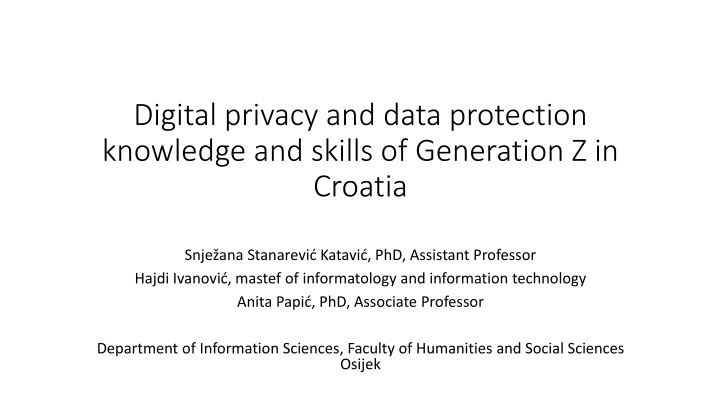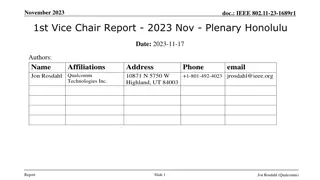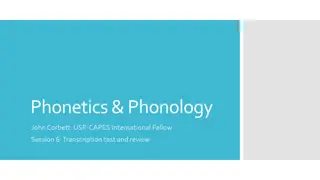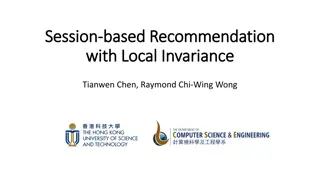
Insights into Generation Z Digital Privacy in Croatia Study
Gain preliminary insights into Generation Z digital privacy awareness and behaviors in Croatia through a study conducted among university students. Explore the attitudes and knowledge related to digital privacy protection among the Croatian Generation Z population.
Download Presentation

Please find below an Image/Link to download the presentation.
The content on the website is provided AS IS for your information and personal use only. It may not be sold, licensed, or shared on other websites without obtaining consent from the author. If you encounter any issues during the download, it is possible that the publisher has removed the file from their server.
You are allowed to download the files provided on this website for personal or commercial use, subject to the condition that they are used lawfully. All files are the property of their respective owners.
The content on the website is provided AS IS for your information and personal use only. It may not be sold, licensed, or shared on other websites without obtaining consent from the author.
E N D
Presentation Transcript
Digital privacy and data protection knowledge and skills of Generation Z in Croatia Snje ana Stanarevi Katavi , PhD, Assistant Professor Hajdi Ivanovi , mastef of informatology and information technology Anita Papi , PhD, Associate Professor Department of Information Sciences, Faculty of Humanities and Social Sciences Osijek
Generation Z (late 1990s - 2010) The first generation of digital natives > rich experience in living the digital life Use of the Internet and mobile devices is a central part of their everyday life The growing number of Generation Z members are becoming a part of the consumer population > it is important to address the privacy issues that inevitably arise.
Scope of the study and its results Research on the digital privacy of young people in Croatia has not been conducted so far. We wanted to get preliminary insights into this topic in the Croatian context on a sample of university students as members of Generation Z. Therefore, research results are not representative for the whole Generation Z in Croatia.
Research objective and research questions The goal the study was to gain insights into the attitudes and behaviors of university students, as members of Croatian Generation Z, related to digital privacy protection. Four research question guided the study.
Methodology A survey method using an online questionnaire. The convenience sampling method > the survey was conducted at the Faculty of Humanities and Social Sciences in Osijek in several study groups in all years of study 149 respondents took part in the research, of which 112 were female (75.2%) and 37 (24.8%) were male.
RQ 1: To what extent and in what ways are respondents informed about digital privacy protection?
How did you learn about digital privacy? Searchin the Internet. 68.5% Results suggest a considerable level of awareness and self- initiative regarding the topic of our interest and raise the question what prompted almost 70% of students to research this topic on their own. At school 63.8% Through the media 57.7% At university 30.9% From family members 28.9% From friends 26.8%
Users level of knowledge about various aspects of digital privacy Seven statements regarding digital privacy were included in the questionnaire and respondents were asked to mark True, False, or I don t know. EXAMPLES: 1. It is recommended to block all cookies on websites. 2. Incognito mode allows complete anonymity while browsing (i.e., hiding the IP address and online activity). 3. You can request that links to websites that contain your name are removed from Google search results if the information is inaccurate, inappropriate, irrelevant, or excessive.
Users level of knowledge about various aspects of digital privacy On average 49.2% answered that they did not know if the statements were true or not. An average of 40% of respondents knew the correct answers Only two statements were correctly marked by more than a 50% of respondents Other websites can track activity on the visited website for marketing purposes - true Incognito mode allows complete anonymity while browsing false. Knowledge in the field of digital privacy among our sample is not comprehensive and uniform and that there is room for improving it.
RQ2: What are the respondents habits and practices related to protection of digital privacy?
How do you protect your data and privacy on the Internet? A multiple choice question 14 strategies offered
50% of offered protective strategies are used by less than 50% od respondents HIGHLIGHTS When using public wireless networks (e.g., in a coffee shop), I do not send or receive sensitive data, but use my data traffic for that. I use the cloud (e.g., Google Drive or Dropbox) to store important and sensitive data. In addition to my private e-mail address, I also have a separate e- mail address for subscribing to various newsletters, registering for websites, or shopping online. 44.3% 42.3% 39.6% Do users do not know about these measures or they do not care?
RQ3: How do members of Generation Z protect their privacy on social networks?
Key findings related to social networks 88.6% of users use 3 or more social networks About a quarter of respondents did not adjust the basic settings for the visibility of information about themselves on social networks. Only half of the respondents (51.7%) report being familiar with the privacy settings on all the social networks they use.
RQ4: What are the experiences and attitudes of members of Generation Z with regard to digital privacy violations?
Have you ever faced a violation of privacy online? A relatively large share of the respondents (43,6%) have faced a violation of privacy. I have never experienced a privacy violation on the Internet. 56.4% Yes, photos of me were published without my consent. 24.4% Yes, my profile has been hacked. 22.1% Yes, someone created a fake profile of me on some social 10.1% networks. Yes, the video in which I appear was published without my 8.1% consent. Yes, my personal data has been misused. 6.7%
Would you like to be further educated on the topic of digital privacy? Yes 65.1% No 18.8% I don t know 16.1%
Concluding remarks Several questions were answered, and multiple questions were raised. Preliminary findings suggest a need for additional and more extensive study of digital privacy issues of Croatian Generation Z.
Thank you for you attention! Questions?






















